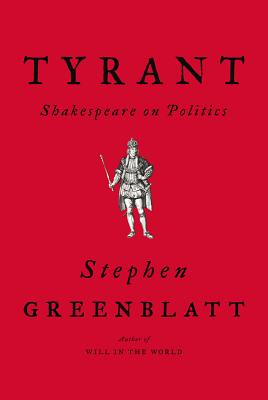

 W. W. Norton & Company
W. W. Norton & Company
Tyrant: Shakespeare on Politics


Key Metrics
- Stephen Greenblatt
- W. W. Norton & Company
- Hardcover
- 9780393635751
- 8.3 X 5.7 X 0.8 inches
- 0.75 pounds
- Literary Criticism > Shakespeare
- English
 Secure Transaction
Secure TransactionBook Description
As an aging, tenacious Elizabeth I clung to power, a talented playwright probed the social causes, the psychological roots, and the twisted consequences of tyranny. In exploring the psyche (and psychoses) of the likes of Richard III, Macbeth, Lear, Coriolanus, and the societies they rule over, Stephen Greenblatt illuminates the ways in which William Shakespeare delved into the lust for absolute power and the catastrophic consequences of its execution.
Cherished institutions seem fragile, political classes are in disarray, economic misery fuels populist anger, people knowingly accept being lied to, partisan rancor dominates, spectacular indecency rules--these aspects of a society in crisis fascinated Shakespeare and shaped some of his most memorable plays. With uncanny insight, he shone a spotlight on the infantile psychology and unquenchable narcissistic appetites of demagogues--and the cynicism and opportunism of the various enablers and hangers-on who surround them--and imagined how they might be stopped. As Greenblatt shows, Shakespeare's work, in this as in so many other ways, remains vitally relevant today.
Author Bio
Stephen Greenblatt is Cogan University Professor of the Humanities at Harvard University. He is the author of fourteen books, including Tyrant: Shakespeare on Politics; The Rise and Fall of Adam and Eve; The Swerve: How the World Became Modern; Shakespeare's Freedom; Will in the World: How Shakespeare Became Shakespeare; Hamlet in Purgatory; Marvelous Possessions; and Renaissance Self-Fashioning.
He is General Editor of The Norton Anthology of English Literature and of The Norton Shakespeare, has edited seven collections of criticism, and is a founding editor of the journal Representations. His honors include the 2016 Holberg Prize from the Norwegian Parliament, the 2012 Pulitzer Prize and the 2011 National Book Award for The Swerve, MLA’s James Russell Lowell Prize (twice), Harvard University’s Cabot Fellowship, the Distinguished Humanist Award from the Mellon Foundation, Yale’s Wilbur Cross Medal, the William Shakespeare Award for Classical Theatre, the Erasmus Institute Prize, two Guggenheim Fellowships and the Distinguished Teaching Award from the University of California, Berkeley.
Among his named lecture series are the Adorno Lectures in Frankfurt, the University Lectures at Princeton, and the Clarendon Lectures at Oxford, and he has held visiting professorships at universities in Beijing, Kyoto, London, Paris, Florence, Torino, Trieste, and Bologna, as well as the Renaissance residency at the American Academy in Rome.
He was president of the Modern Language Association of America and a long-term fellow of the Institute for Advanced Study in Berlin. He has been elected to membership in the American Academy of Arts and Sciences, the American Academy of Arts and Letters, the American Philosophical Society, the Italian literary academy Accademia degli Arcadi, and is a fellow of the British Academy.
Source: Harvard University Department of English
Videos
No Videos
Community reviews
Write a ReviewNo Community reviews